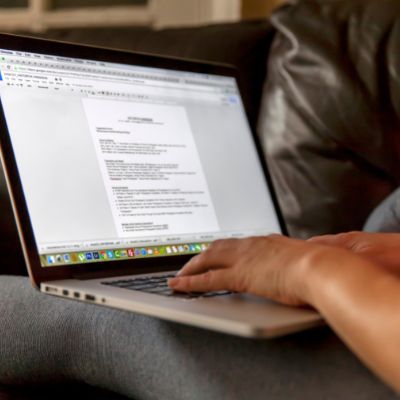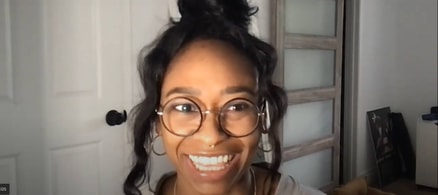What is a cover letter?
Working in tandem with your resume, a cover letter gives potential employers a more nuanced and personal look at what you have to offer.
Yes, your resume provides all the basic information about your experience and education, but that doesn’t convey everything there is to know about you and why you’re a good fit.
You can use your cover letter to connect the dots between you and the company.
What makes you special? How do your goals align with the job? Is there a relevant story from your past that illustrates why you’re the ideal candidate?
A good cover letter can help you stand out among hundreds of applicants applying for a job you want — often with similar resumes.
While a cover letter can be a useful tool, there’s an important question you need to ask yourself:
Apply with one click
Don't have your next job lined up? ZipRecruiter is rated the #1 job site in the U.S. If you’re looking for a job, you can sign up and put ZipRecruiter to work for you. We help you save time by making it easy to apply to jobs with one click.
Sign up for freeShould I be writing a cover letter?
Some hiring managers consider cover letters outdated, but it all depends on what kind of job you’re applying for.
With any job that involves writing or communication, your cover letter can be even more important than your resume. Recruiters will see it as an opportunity to evaluate your core skills.
Cover letters are also useful if you’re changing industries or don’t have a lot of experience. If your resume isn’t a clear match with the position you want, a cover letter can help make a case for why you’re still the best candidate.
Even if it doesn’t get read at all, the mere presence of a cover letter helps recruiters pick out the quality applicants who are serious about the role.
Whether it’s your first or 100th time writing a cover letter, here are a few tips to do it right.
Do your research
While the job posting is a key resource to help you understand the role and the company, you shouldn’t stop there.
Researching the company will give you a broader picture of its values, mission and culture.
You can use what you find to inform your approach. Maybe you’ll decide to change up your tone or reference some charity work you wouldn’t have thought relevant.
Your research will also help you find the right person to address your cover letter to. A “To whom it may concern” or “Dear hiring committee” can be an immediate turn off.
Often, a job posting will list the position you’ll report to or the department you’ll join, so check the company website for the right individual.
Let employers apply to you
Show off your resume. We will show your profile to employers that fit so they can invite you to apply. Candidates who are invited to apply are nearly 3 times as likely to get hired.
Sign up nowGo wild on the first draft
Figuring out what to say in your cover letter — and how to say it — will be a challenge. Don’t try to do it all correctly on the first go, or you’ll just tie yourself in knots.
Embrace the idea of writing a bad first draft. Even though it will be rough, the process will help you figure out what’s not important to include and what sounds wrong to the ear.
Use slang, be funny, break all the rules if you want. Just get something on the page — and make sure you save this draft with a different title so you don’t send it in by accident.
Don’t just repeat your resume
If you’re just going to repeat all of your resume points, why bother sending a second document?
Your cover letter gives your resume context. Sure, you might have “Microsoft Office'' listed as a relevant skill, but so do most of your rivals.
Take the time in your cover letter to outline how you’ve used that skill to provide value to your previous employers. The old writing advice rings true here, as well: “Show, don’t tell.”
Make it personal
This isn’t the time to overshare about your passion for ballet. However, you do want to show the company who you are beyond your resume.
This is where your research comes in handy.
Does the company have a particular initiative you would love to be a part of? Is the leader of your team an alumni from your school?
Making connections between you and the company will help your recruiter or potential employer see how you already fit in.
Reword your cover letter to match the post
Applicant Tracking Systems (ATS) have become increasingly popular in recent years. These programs scan applications to eliminate people that don’t seem to meet the job requirements.
Big job sites partner with dozens of these systems, so there’s a good chance your application will go through one.
Read over the job posting carefully, as it will help you guess the exact words your employers are filtering for. It could be a critical piece of software you know or a specific certification.
While these keywords are important to include in your resume, a cover letter can help you hit some terms you might be missing.
Start strong
You don’t know if you’re the first application a recruiter is reading that day or the 50th.
It’s important to hook whoever’s reading your cover letter from the very first line. Something rote like “I’m excited to apply for this position” won’t do you any favors.
Do you know someone at the company? Name drop them. Do you have experience at one of their competitors? Use it. Did something about the company resonate with you? Let them know.
Keep it simple, but don’t be boring
You’re not writing the next great American novel; you’re trying to get a job.
Again, recruiters are sometimes reading hundreds of cover letters, so you want to make sure they don’t dread reading it just by looking at it.
Don’t use cool fonts or bold colors, keep it under 250 words and make every word count.
Remove filler words like “I think” or “I feel” — you’re making an argument for yourself, so sound assertive.
Pass on bullet points
Bullet points might seem like a good way to break up the text and highlight certain skills or experiences, but they make it look like you’re recycling your resume.
While it’s OK to start writing by organizing your thoughts into bullet points, you should take those points and weave them into an engaging narrative.
That’s the whole point of a cover letter: to provide the context bullet points can’t provide.
Quadruple check for errors
A spelling or grammar mistake is perhaps the quickest way to turn your resume into recycling.
Mixing up your tenses or typing the wrong word shows you can be careless, even when it’s your own fortunes on the line and not the company’s.
If you’ve been reading your cover letter for too long and start going cross-eyed, getting a friend or program to read the text out loud can help you catch those hidden blunders.
Get in, get out
You don’t want to waste a lot of time at the end of your cover letter with pleasantries. Adding too much filler at the end will bore the person you’re trying to entice.
You can be brief without being blunt. The weary manager reading your letter won’t be offended.
If you’re not sure what to write, you can always end the letter with a simple "Thank you for your time and consideration. I look forward to hearing from you. Best, [Name].”
Sponsored
Know you’re a great match
We tell you if you’re a strong candidate so you can prioritize where to apply. ZipRecruiter uses AI technology to match your skills to jobs you may not have found otherwise.







